Surf Vocal Groups
Beach Boys
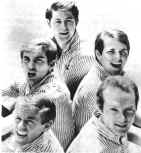
Clockwise from bottom left: Al Jardine,
Dennis Wilson, Brian Wilson, Carl Wilson, Mike Love
An American musical institution, the Beach Boys parlayed a
repertoire of songs about surfing, cars, and girls into the basis
for one of the country's longest lasting success stories.
Members:
Mike Love - lead - vocals and sax
Brian Wilson - keyboard and bass guitar
Carl Wilson - guitar
Al Jardine - rhythm guitar - replaced by David
Marks - replaced by Al Jardine
Dennis Wilson - drums
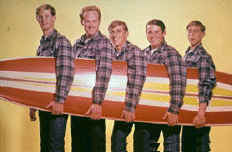
L to R: Brian Wilson, Mike Love, Dennis
Wilson, Carl Wilson, David Marks
Formed in Hawthorne, California in 1961, the group included
brothers Brian, Dennis, and Carl Wilson, their cousin Mike Love,
and friend Al Jardine. Mike sang most of the leads while Brian
led on some of the vocals.

Murry Wilson
The group began as Kenny and the Cadets, Carl and the
Passions, and finally the Pendletones. Brian a fan of the Four
Freshman, began teaching the others intricate Freshman styled
harmonies. Murry Wilson, the father of the brothers and a
songwriter, took the boys to his publisher Hite Morgan who in
turn took the to Keen Recording Studios. Dennis the only
member of the group who surfed thought that it would be a good
subject for a song and suggested it to Brian. Brian then wrote
"Surfin" and with Mike wrote "Surfin'
Safari," songs they made into demos in 1961.
Murry took the demos to Herb Newman, who owned Candix and Era
Records. On December eighth Newman signed the group. Ross Regan,
Era's promotion man, suggested they change their name to the
Beach Boys. In December 1961 "Surfin' was issued on X
Records as a promo and Candix.
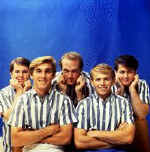
On February 17, 1962, "Surfin" hit the national pop
charts, reaching #75. On New Year's eve the group performed at
its first important show as the Beach Boys at the Long Beach
Municipal Stadium in a memorial concert for Ritchie Valens. They
were paid three hundred dollars.
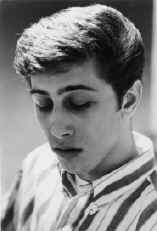
David Marks
In February 1962 Jardine left to study dentistry. On February
8th, Brian, Dennis, and Val Poliuto of the Jaguars recorded six
songs for Hite Morgan's Deck Records. In May Candix went out of
business and Murray Wilson, now the groups manager, began taking
their demos around. Several labels passed on the group, but
Capitol's Nick Venet liked the demo of "Surfin'
Surfari" and signed the group in June. a master of
"Surfin' Safari" was recorded with new member David
Marks, who had replaced Jardine. On August 11, 1962 "Surfin'
Surfari" reached #14 and the flip side "409"
charted at #76.
In early 1963 Jardine returned and Marks his replacement left.
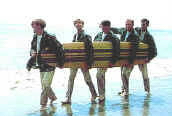
"Surfin' Safari" marked the beginning of the unique
harmonies the group would become known for. This was a new style
of rock and roll with Chuck Berry rhythms and Four Freshman
harmony. "Surfin' U.S.A.," written by Brian Wilson and
Mike Love, was so close to Berry's "Sweet Little
Sixteen" that his threat of a lawsuit got him sole writing
credits. By May 25th it had reached number three in the U.S.A.;
it went on to reach number thirty-two in England and number nine
in Australia. The flip side, a hotrod song, "Shutdown,"
reached number twenty-three.
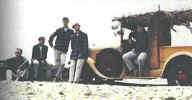
The next surfing/drag racing two sider was the groups' first
ballad "Surfer Girl" (#7 Pop, #18 R&B), along with
Little Deuce Coupe" (#15 Pop).

The Beach Boys "Surfin' U.S.A." went all the
way to number two, denied the top spot by Jan and Dean's
"Surf City," written by their friend Brian Wilson. the
group's popularity was such that two Brian Wilson produced
albums, released almost simultaneous, hit the top ten; Surfer
Girl (#70) and Little Deuce Coupe (#4).
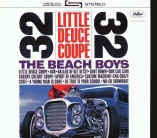
The Beach Boy's next single, "Be True to Your
School" reached number six on December 21, 1963. The flip
side "In My Room" went to number twenty-three.
One of their best rocker's "Fun, Fun, Fun," with
Mike Love on lead and a Chuck Berry intro, reached #5 on March
21, 1964.
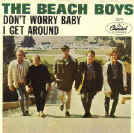
The first number one came next as "I Get Around,"
with Love again on the lead, hit the top spot in early June 1964.
More hits followed in 1964 with "When I Grow Up" (#9)
and "Dance, Dance, Dance" with Brian on the lead
(#8).
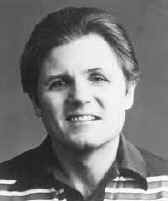
Bruce Johnston
Conducting their first major U.S. tour in September, 1964, The
Beach Boys Concert album, recorded in Sacramento, California ,
became the first live album to top the charts. However, on
December 23, while on a plane trip from Houston to Los Angeles,
Brian had a nervous breakdown brought on by an overwhelming
schedule of writing, producing, recording, and touring. Brian
stopped touring with the band and guitarist/singer Glenn Campbell
was brought in to perform for him on the road, who was replaced
by Bruce Johnston in April, 1965.
In 1965 the Beach Boys did a remake of Bobby Freeman's hit
"Do You Wanna Dance" with Dennis Wilson on lead, it
went to number twelve. By April Bruce Johnson of the Ripchords,
had replaced Campbell.
In the spring of 1965 "Help Me Rhonda" became the
groups second number one pushing the Beatles "Ticket to
Ride" out of the top spot.
Despite a hearing lose in his right ear, Brian continued to
write and produce vocal harmony hits. One of them
"California Girls" had a memorable keyboard intro and
with Love on lead reached number three on August 28, 1965. Then
"Barbara Ann" soared to number two nationally with Dean
Torrance of Jan and Dean on lead.











